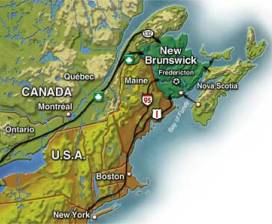Canadian companies at odds over poultry supply regulations

The Canadian government has rejected a proposed solution that would stabilise New Brunswick’s dysfunctional poultry supply management system.
The government’s lack of action represents continued mismanagement and abdication of its legislative responsibility, says Nadeau Poultry General Manager Yves Landry. The government’s refusal to implement a solution, he says, has resulted in the loss of over 160 jobs, and economic devastation in the small community of Saint-François-de-Madawaska, where Nadeau Poultry has been a major employer for more than 50 years.
Landry says that previous New Brunswick governments have turned a blind eye as limits were removed on the amount of the province’s chicken production quota that could be held by any single producer. Historically, a producer was restricted from controlling more than 10% of the product. Groupe Westco, says Landry, has built a production cartel that today controls almost 80% of the commodity, a level of control unprecedented in Canada.
Since September 2009, Groupe Westco has diverted the chickens it now controls to its partner Olymel in Quebec for processing. “After ignoring the issue while it was happening, the government now continues to sidestep it and refuses to intervene, says Landry. “By doing so, they are in fact rewarding Westco’s very questionable business practices in attempting to starve Nadeau of chickens. Not to mention Groupe Westco’s total disregard for the devastating economic and human toll on a small community where so many jobs have been lost.”
New Brunswick should look to other provinces for examples of what should happen here, says CEO Maple Lodge Farms Michael Burrows. “Different provinces use different tools to ensure supply management remains stable and that the interests of all stakeholders are protected,” he says. Burrows pointed to Manitoba as an example: “Despite appeals to the Manitoba Minister of Agriculture, Groupe Westco was not allowed to exceed the regulated quota limits.” In British Columbia, not unlike the situation in New Brunswick, a producer entered the processing sector as well. However, British Columbia had plant supply allocation, he added, and that maintained stability.
Nadeau Poultry invested millions in a state-of-the art plant in 2002 when the original plant was destroyed by fire. In addition to its long time commitment to the community, Nadeau rebuilt based on the expectation of a stable supply of product as guaranteed in supply management, says Burrows. “Instead, we’re scrambling for product, depending temporarily on chickens from Nova Scotia to keep as many employees as possible on the job.” But that supply will soon end, he says, with the construction of a new processing facility scheduled to open in 2012. Sourcing chickens from Ontario or Quebec is also challenged by moratoriums on the export of chickens in those provinces as a means to protect their own processors.
The solution recently rejected by the New Brunswick government, says Burrows would involve the establishment of the New Brunswick Chicken Marketing Agency, which would deal solely with the marketing of broiler chickens past the farm gate and would allocate live chicken supply to processors both within and outside New Brunswick. This is known as single desk selling. The current regulatory bodies would retain all other powers within their current mandate.
The establishment of this single desk selling for poultry and equipping it with the appropriate authority, such as what New Brunswick already has for turkey, will ensure adequate supply of New Brunswick grown chickens to New Brunswick processors,” says Burrows.
This approach exists today in New Brunswick’s milk marketing system. The beauty of the proposed approach is that it allows fair treatment for all processors in the province.” For example, the chickens would be equally divided if Westco were to build a new plant,” says Burrows. “It’s a fair and equitable solution that would restore stability in the province’s poultry supply management system.”
Canada’s Agriculture, Aquaculture and Fisheries Minister Michael Olscamp said in a statement “From the beginning, this issue with chicken supply in New Brunswick has been between two companies that, for the past several years, have been at odds. The provincial government has done everything in its power to help these companies resolve the issue. All attempts by the provincial government have been legally challenged and struck down by the courts. We must respect those legal decisions.”












